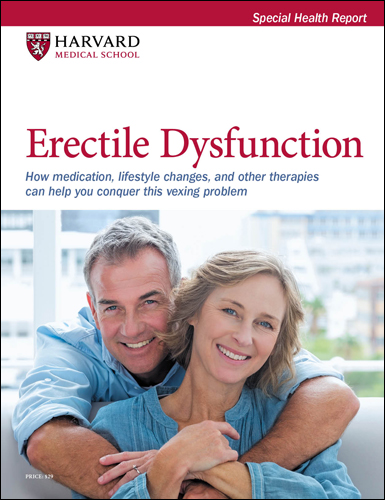Recent Articles

Medication side effects: What are your options?

Independent living with home care assistance: Balancing autonomy and support

Dialysis: What to expect from this life-changing — and lifesaving — treatment

The BEEP program: Keep your balance

Hoarding: What to know about this mental health disorder

21 spices for healthy holiday foods

Listeria: How to protect yourself from this common cause of food poisoning

Adult day care can benefit older adults and their caregivers

Digestive enzymes: How supplements like Lactaid and Beano can help with digestion

Can probiotics help calm inflammatory bowel disease?


Erectile Dysfunction
With all the ads on TV and in magazines heralding treatments for erectile dysfunction (ED). But it’s important to be aware that many men can ease, or even reverse, ED by making simple lifestyle changes — such as losing excess weight and quitting smoking — that also are likely to boost their overall health and reduce their chances of developing diabetes, cardiovascular disease, and metabolic syndrome. This Special Health Report, Erectile Dysfunction, offers a comprehensive review of these treatments, as well as the causes of erectile dysfunction and how ED may be an early warning sign for other serious health problems.
Other Product Information
With all the ads on TV and in magazines heralding pills to treat erectile dysfunction (ED), it’s tempting to think that treatment for ED begins and ends with a prescription. These drugs are safe, easy to use, and for many men, quite effective. But it’s important to be aware that many men can ease, or even reverse, ED by making simple lifestyle changes — such as losing excess weight and quitting smoking — that also are likely to boost their overall health and reduce their chances of developing diabetes, cardiovascular disease, and metabolic syndrome. And these oral medications for ED don’t work for all men. Luckily several other treatments are available.
This report offers a comprehensive review of these treatments, as well as the causes of erectile dysfunction and how ED may be an early warning sign for other serious health problems such as heart disease or high blood pressure. It also includes information on sex therapy, involving your partner in treatment, and talking to your doctor about ED, as well as a special section on “Creating a better sex life.”
Prepared by the editors of the Harvard Health Publishing in consultation with Michael Philip O'Leary, M.D., Senior Surgeon at Brigham and Women's Hospital, Professor of Surgery at Harvard Medical School, and Director, Men’s Health Center, Brigham and Women’s Hospital. 52 pages. (2021)
Viagra and other PDE5 inhibitors
Sildenafil (Viagra) revolutionized the way doctors treat ED, largely because it is effective and easy to use. But it is no longer the only drug option. Since 1998, when sildenafil became available, the FDA has approved a number of similar medications—namely, vardenafil (Levitra, Staxyn), tadalafil (Cialis), and avanafil (Stendra). And it has also approved a low-dose version of Cialis for daily use, creating an option that—theoretically, at least— makes having intercourse a possibility without advance planning. Another similar ED drug, udenafil (Zydena), is currently not approved for use in the United States, although it is available in a number of other countries.
All of these drugs—known medically as PDE5 inhibitors—work in a similar fashion. They block PDE5, an enzyme that breaks down the erection-producing chemical cyclic guanosine monophosphate. Without the enzyme to “shut off” erections, the penis fills with blood and stays erect long enough for intercourse. Of course, it’s important to realize that none of these drugs is an aphrodisiac. You must feel sexually aroused in order for them to work.
The main differences among the drugs have to do with how quickly they begin to work (onset), how long their effects last (duration), and how much they cost.
Onset and duration
One consideration in choosing an ED drug is how long you have to wait between taking the medication and having sex. Daily Cialis supplies a constant low level of the drug in your bloodstream, so you are always ready. With the other drugs, which are taken “as needed,” there is a wait time. Levitra may start working faster than Viagra (within a half-hour instead of an hour)—and Staxyn, which dissolves under the tongue, may work marginally faster than Levitra—although the FDA says that all of these drugs should be taken about an hour before sexual activity.
Note that the action of any of these medications may be delayed or impaired if you take them with food, especially high-fat foods. The delay is particularly noticeable with Viagra.
Another consideration is how long the effect lasts. The biggest advantage of nondaily Cialis is that it lasts the longest—24 to 36 hours, on average, which is why it’s sometimes called the “weekend drug.” Viagra and Levitra last about four to five hours (and sometimes as long as 12 hours), while Stendra lasts about six.
- Understanding ED
- What is ED?
- How common is ED?
- How an erection occurs
- Causes of ED
- Vascular disease
- Neurological problems
- Metabolic syndrome
- Diabetes
- Prostate cancer
- Benign prostatic hyperplasia
- Medications
- Hormonal disorders
- Psychological factors
- Weight control and exercise
- Smoking
- Alcohol and substance abuse
- Other culprits
- Diagnosing ED
- Providing your medical history
- The physical exam
- Additional test
- A questionnaire to evaluate ED
- Treating ED
- Including your partner
- Counseling
- The PDE5 inhibitors: Viagra, Levitra, and Cialis
- Injections
- MUSE therapy
- Yohimbine (Yocon)
- Devices to help achieve or maintain an erection
- Vascular surgery
- Surgery for Peyronie’s disease
- Hormone therapy
- Surgical implants
- Special bonus section: Creating a better sex life
- Resources
- Glossary
You might also be interested in…

Sexuality in Midlife and Beyond
The physical transformations the body undergoes with age have a major influence on sexuality. This Special Health Report, Sexuality in Midlife and Beyond, will take you through the stages of sexual response and explain how aging affects each. You’ll also learn how chronic illnesses, common medications, and emotional issues can influence your sexual capabilities. Finally, you’ll find a detailed discussion of various medical treatments, counseling, and self-help techniques to address the most common types of sexual problems.
Recent Articles

Medication side effects: What are your options?

Independent living with home care assistance: Balancing autonomy and support

Dialysis: What to expect from this life-changing — and lifesaving — treatment

The BEEP program: Keep your balance

Hoarding: What to know about this mental health disorder

21 spices for healthy holiday foods

Listeria: How to protect yourself from this common cause of food poisoning

Adult day care can benefit older adults and their caregivers

Digestive enzymes: How supplements like Lactaid and Beano can help with digestion

Can probiotics help calm inflammatory bowel disease?
Free Healthbeat Signup
Get the latest in health news delivered to your inbox!
Sign Up

